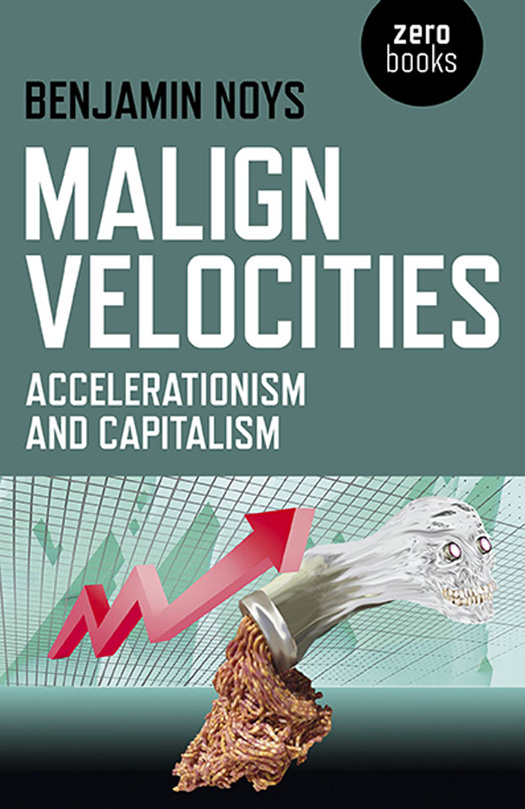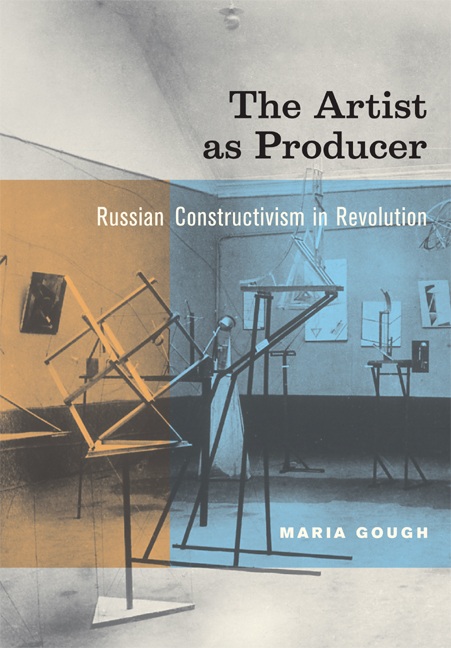Benjamin Noys: Malign Velocities: Accelerationism and Capitalism (2014)
Filed under book | Tags: · accelerationism, capitalism, communism, cyberpunk, futurism, labour, machine, marxism, movement, philosophy, speed, technology

“We are told our lives are too fast, subject to the accelerating demand that we innovate more, work more, enjoy more, produce more, and consume more. That’s one familiar story. Another, stranger, story is told here: of those who think we haven’t gone fast enough. Instead of rejecting the increasing tempo of capitalist production they argue that we should embrace and accelerate it. Rejecting this conclusion, Malign Velocities tracks this ‘accelerationism‘ as the symptom of the misery and pain of labour under capitalism. Retracing a series of historical moments of accelerationism – the Italian Futurism; communist accelerationism after the Russian Revolution; the ‘cyberpunk phuturism’ of the ’90s and ’00s; the unconscious fantasies of our integration with machines; the apocalyptic accelerationism of the post-2008 moment of crisis; and the terminal moment of negative accelerationism – suggests the pleasures and pains of speed signal the need to disengage, negate, and develop a new politics that truly challenges the supposed pleasures of speed.”
Publisher Zero Books, 2014
ISBN 1782793003, 9781782793007
130 pages
EPUB, EPUB (updated on 2019-6-9)
Comment (0)Masha Gessen: The Man Without a Face: The Unlikely Rise of Vladimir Putin (2012)
Filed under book | Tags: · 1990s, 2000s, biography, communism, economy, history, intelligence agency, mass media, military, politics, russian, war

Handpicked in 1999 by the ‘Family’ surrounding an ailing and increasingly unpopular Boris Yeltsin, Vladimir Putin, with very little governmental or administrative experience beyond having served as deputy mayor of St Petersburg, seemed like the perfect choice in the eyes of an oligarchy bent on moulding the president’s successor to its own designs. Suddenly the boy who had scrapped his way through post-war Leningrad schoolyards, dreaming of ruling the world, was a public figure, and his popularity soared. Russia and an infatuated West were determined to see the progressive leader of their dreams, even as with ruthless efficiency Putin dismantled the country’s media, wrested control and wealth from the country’s burgeoning business class, and decimated the fragile mechanisms of democracy. Within a few brief years, virtually every obstacle to his unbridled control was removed and every opposing voice silenced, with political rivals and critics driven into exile or to the grave. As a journalist living in Moscow, Masha Gessen experienced this history firsthand, and for The Man Without a Face she has drawn on information and sources no other writer has tapped. Her horrifying and spellbinding account of how this ‘faceless’ man manoeuvred his way into absolute – and absolutely corrupt – power will stand as a classic of narrative non-fiction.
Publisher Riverhead Books, 2012
EISBN 9781101560600
Video interview with the author (52 min, Sydney Writers Festival, May 2012)
Review (Luke Harding, The Guardian, 2012)
Review (Anne Applebaum, The New York Review of Books, 2012)
Review (John Ehrman, Studies in Intelligence, 2014)
Maria Gough: The Artist as Producer: Russian Constructivism in Revolution (2005)
Filed under book | Tags: · 1920s, architecture, art, art history, art theory, avant-garde, communism, composition, constructivism, electricity, formalism, functionalism, politics, productivism, revolution, russia

“The Artist as Producer reshapes our understanding of the fundamental contribution of the Russian avant-garde to the development of modernism. Focusing on the single most important hotbed of Constructivist activity in the early 1920s—the Institute of Artistic Culture (INKhUK) in Moscow—Maria Gough offers a powerful reinterpretation of the work of the first group of artists to call themselves Constructivists. Her lively narrative ranges from famous figures such as Aleksandr Rodchenko to others who are much less well known, such as Karl Ioganson, a key member of the state-funded INKhUK whose work paved the way for an eventual dematerialization of the integral art object.
Through the mining of untapped archives and collections in Russia and Latvia and a close reading of key Constructivist works, Gough highlights fundamental differences among the Moscow group in their handling of the experimental new sculptural form—the spatial construction—and of their subsequent shift to industrial production. The Artist as Producer upends the standard view that the Moscow group’s formalism and abstraction were incompatible with the sociopolitical imperatives of the new Communist state. It challenges the common equation of Constructivism with functionalism and utilitarianism by delineating a contrary tendency toward non-determinism and an alternate orientation to process rather than product. Finally, the book counters the popular perception that Constructivism failed in its ambition to enter production by presenting the first-ever case study of how a Constructivist could, and in fact did, operate within an industrial environment. The Artist as Producer offers provocative new perspectives on three critical issues—formalism, functionalism, and failure—that are of central importance to our understanding not only of the Soviet phenomenon but also of the European vanguards more generally.”
Publisher University of California Press, 2005
ISBN 9780520226180
xi+257 pages
Reviews: Paul Wood (Art Journal, 2006), Charlotte Douglas (Modernism/modernity, 2006), Elizabeth Kridl Valkenier (Russian Review, 2006), Patricia Railing (Slavic Review, 2007), Douglas Greenfield (Slavic and East European Journal, 2007), Roann Barris (SECAC Review, 2007).
PDF (21 MB, no OCR)
Comment (1)
